Socio-Economic Factors and Their Effects on Health: Research Proposal
VerifiedAdded on 2023/01/06
|36
|13593
|88
Report
AI Summary
This research proposal investigates the significant impact of socio-economic factors, particularly income and education, on individual health and well-being. The study aims to understand the concept of these factors, identify associated health challenges, and recommend solutions to mitigate negative health outcomes. The methodology includes a qualitative research approach, employing a descriptive research design and thematic analysis of secondary data sources such as government reports, journal articles, and online resources. The proposal outlines the research questions, literature review, and data collection methods, including ethical considerations and limitations. Key themes explored include the relationship between socio-economic status and health, health inequalities within the UK's NHS healthcare system, and the health conditions prevalent among low socio-economic populations, as well as initiatives by the NHS to address these issues. The research intends to provide valuable insights into the complex interplay between socio-economic factors and health outcomes and propose effective strategies for improving public health.
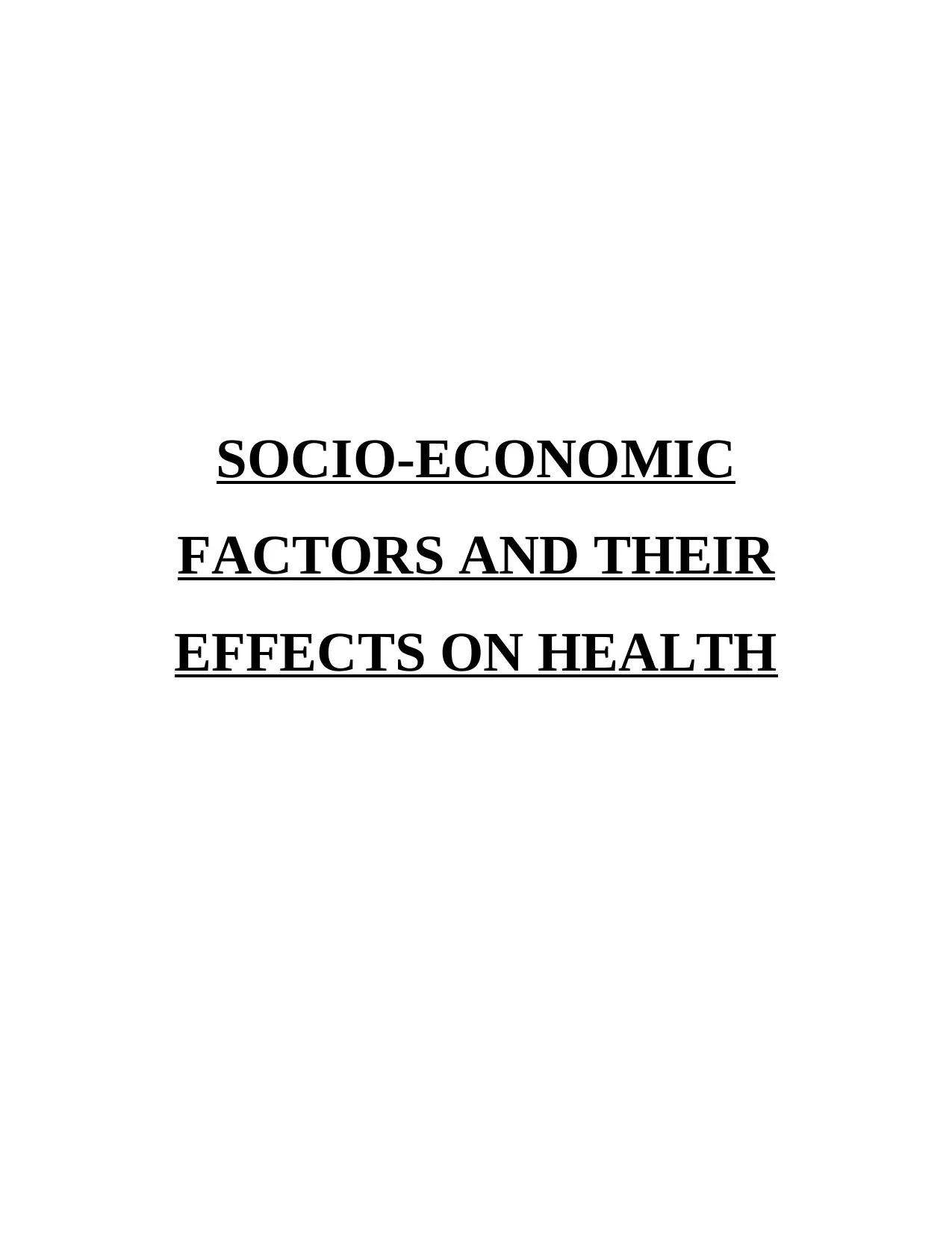
SOCIO-ECONOMIC
FACTORS AND THEIR
EFFECTS ON HEALTH
FACTORS AND THEIR
EFFECTS ON HEALTH
Paraphrase This Document
Need a fresh take? Get an instant paraphrase of this document with our AI Paraphraser
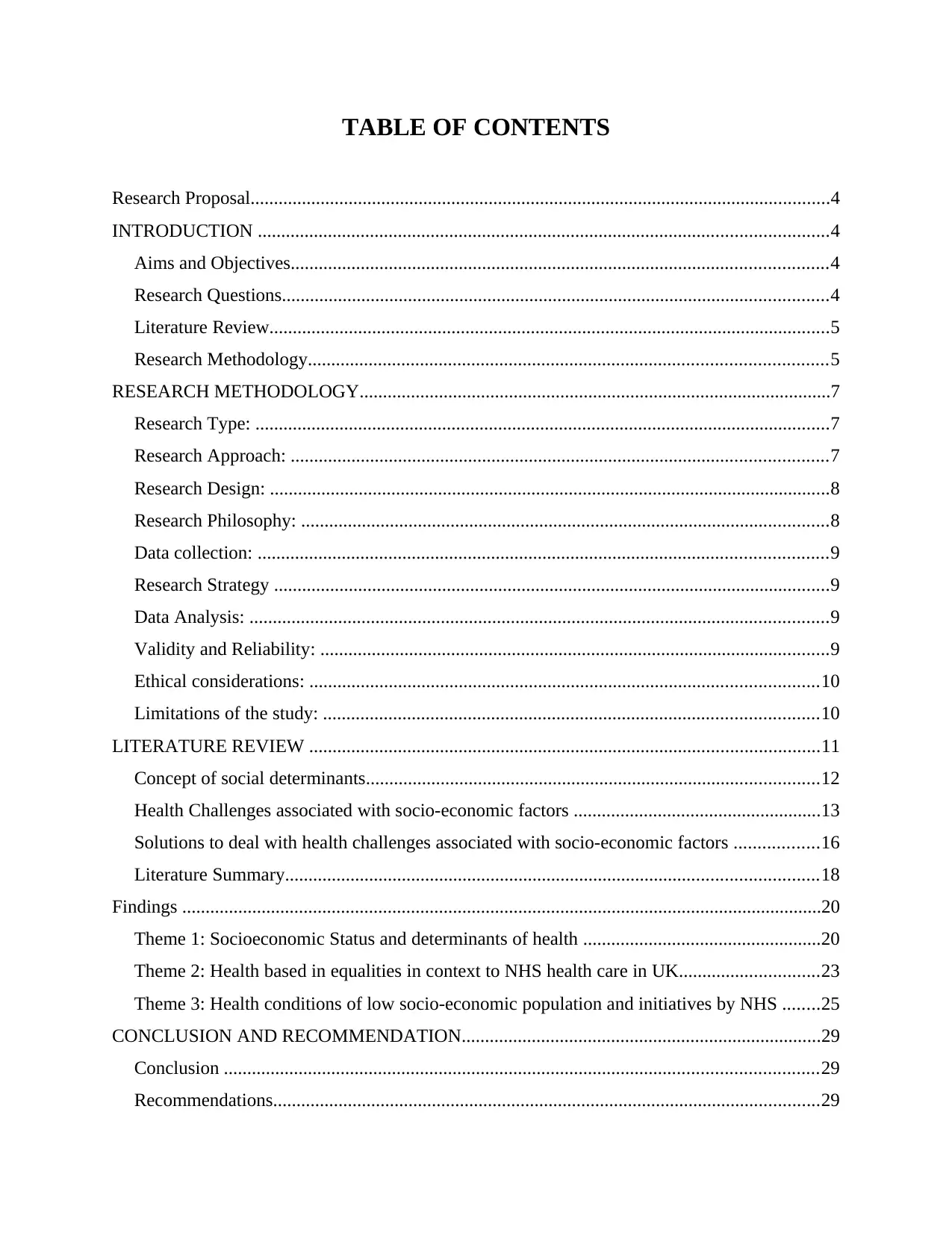
TABLE OF CONTENTS
Research Proposal............................................................................................................................4
INTRODUCTION ..........................................................................................................................4
Aims and Objectives...................................................................................................................4
Research Questions.....................................................................................................................4
Literature Review........................................................................................................................5
Research Methodology...............................................................................................................5
RESEARCH METHODOLOGY.....................................................................................................7
Research Type: ...........................................................................................................................7
Research Approach: ...................................................................................................................7
Research Design: ........................................................................................................................8
Research Philosophy: .................................................................................................................8
Data collection: ..........................................................................................................................9
Research Strategy .......................................................................................................................9
Data Analysis: ............................................................................................................................9
Validity and Reliability: .............................................................................................................9
Ethical considerations: .............................................................................................................10
Limitations of the study: ..........................................................................................................10
LITERATURE REVIEW .............................................................................................................11
Concept of social determinants.................................................................................................12
Health Challenges associated with socio-economic factors .....................................................13
Solutions to deal with health challenges associated with socio-economic factors ..................16
Literature Summary..................................................................................................................18
Findings .........................................................................................................................................20
Theme 1: Socioeconomic Status and determinants of health ...................................................20
Theme 2: Health based in equalities in context to NHS health care in UK..............................23
Theme 3: Health conditions of low socio-economic population and initiatives by NHS ........25
CONCLUSION AND RECOMMENDATION.............................................................................29
Conclusion ...............................................................................................................................29
Recommendations.....................................................................................................................29
Research Proposal............................................................................................................................4
INTRODUCTION ..........................................................................................................................4
Aims and Objectives...................................................................................................................4
Research Questions.....................................................................................................................4
Literature Review........................................................................................................................5
Research Methodology...............................................................................................................5
RESEARCH METHODOLOGY.....................................................................................................7
Research Type: ...........................................................................................................................7
Research Approach: ...................................................................................................................7
Research Design: ........................................................................................................................8
Research Philosophy: .................................................................................................................8
Data collection: ..........................................................................................................................9
Research Strategy .......................................................................................................................9
Data Analysis: ............................................................................................................................9
Validity and Reliability: .............................................................................................................9
Ethical considerations: .............................................................................................................10
Limitations of the study: ..........................................................................................................10
LITERATURE REVIEW .............................................................................................................11
Concept of social determinants.................................................................................................12
Health Challenges associated with socio-economic factors .....................................................13
Solutions to deal with health challenges associated with socio-economic factors ..................16
Literature Summary..................................................................................................................18
Findings .........................................................................................................................................20
Theme 1: Socioeconomic Status and determinants of health ...................................................20
Theme 2: Health based in equalities in context to NHS health care in UK..............................23
Theme 3: Health conditions of low socio-economic population and initiatives by NHS ........25
CONCLUSION AND RECOMMENDATION.............................................................................29
Conclusion ...............................................................................................................................29
Recommendations.....................................................................................................................29

Alternative method: ................................................................................................................31
REFERENCES..............................................................................................................................32
REFERENCES..............................................................................................................................32
⊘ This is a preview!⊘
Do you want full access?
Subscribe today to unlock all pages.

Trusted by 1+ million students worldwide
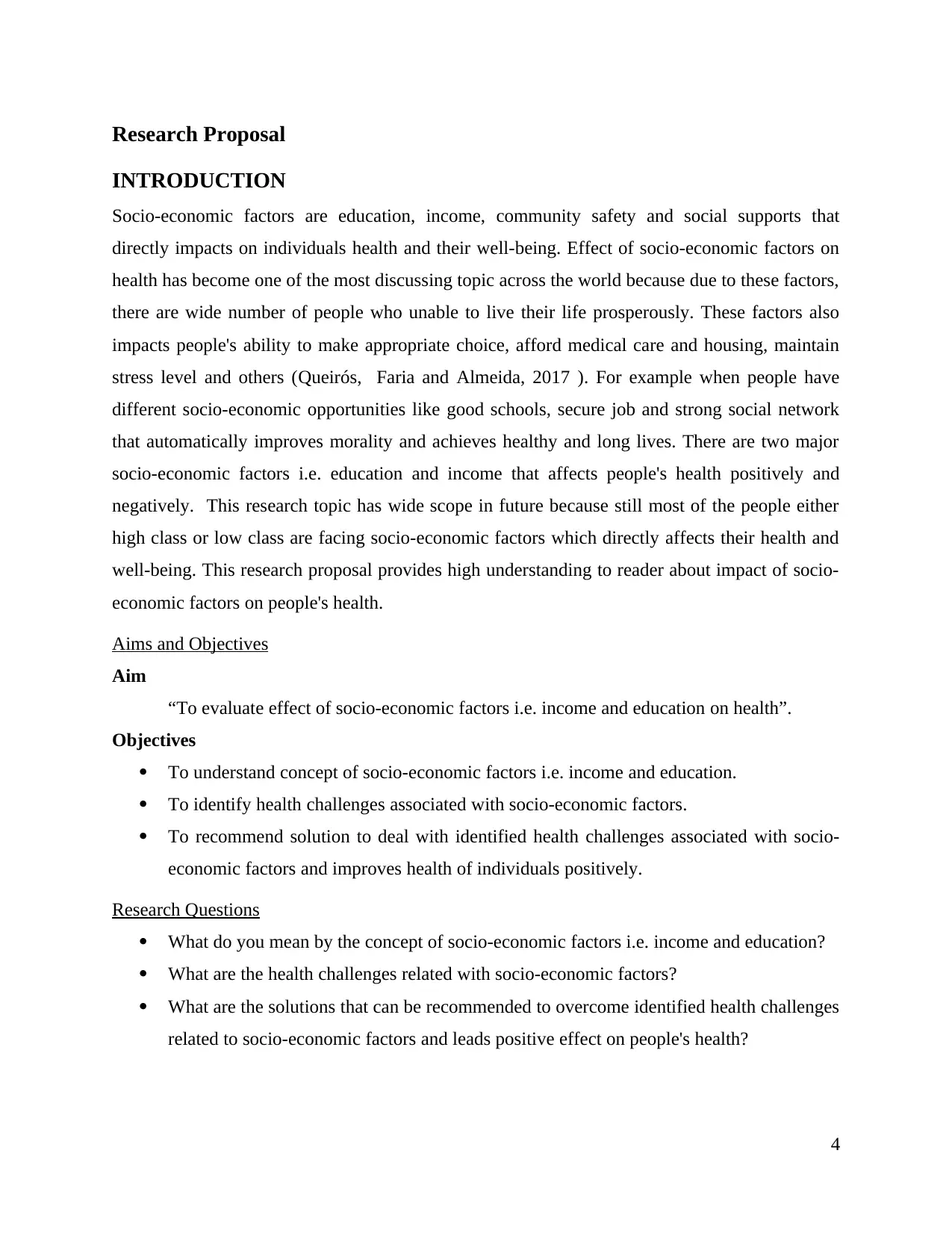
Research Proposal
INTRODUCTION
Socio-economic factors are education, income, community safety and social supports that
directly impacts on individuals health and their well-being. Effect of socio-economic factors on
health has become one of the most discussing topic across the world because due to these factors,
there are wide number of people who unable to live their life prosperously. These factors also
impacts people's ability to make appropriate choice, afford medical care and housing, maintain
stress level and others (Queirós, Faria and Almeida, 2017 ). For example when people have
different socio-economic opportunities like good schools, secure job and strong social network
that automatically improves morality and achieves healthy and long lives. There are two major
socio-economic factors i.e. education and income that affects people's health positively and
negatively. This research topic has wide scope in future because still most of the people either
high class or low class are facing socio-economic factors which directly affects their health and
well-being. This research proposal provides high understanding to reader about impact of socio-
economic factors on people's health.
Aims and Objectives
Aim
“To evaluate effect of socio-economic factors i.e. income and education on health”.
Objectives
To understand concept of socio-economic factors i.e. income and education.
To identify health challenges associated with socio-economic factors.
To recommend solution to deal with identified health challenges associated with socio-
economic factors and improves health of individuals positively.
Research Questions
What do you mean by the concept of socio-economic factors i.e. income and education?
What are the health challenges related with socio-economic factors?
What are the solutions that can be recommended to overcome identified health challenges
related to socio-economic factors and leads positive effect on people's health?
4
INTRODUCTION
Socio-economic factors are education, income, community safety and social supports that
directly impacts on individuals health and their well-being. Effect of socio-economic factors on
health has become one of the most discussing topic across the world because due to these factors,
there are wide number of people who unable to live their life prosperously. These factors also
impacts people's ability to make appropriate choice, afford medical care and housing, maintain
stress level and others (Queirós, Faria and Almeida, 2017 ). For example when people have
different socio-economic opportunities like good schools, secure job and strong social network
that automatically improves morality and achieves healthy and long lives. There are two major
socio-economic factors i.e. education and income that affects people's health positively and
negatively. This research topic has wide scope in future because still most of the people either
high class or low class are facing socio-economic factors which directly affects their health and
well-being. This research proposal provides high understanding to reader about impact of socio-
economic factors on people's health.
Aims and Objectives
Aim
“To evaluate effect of socio-economic factors i.e. income and education on health”.
Objectives
To understand concept of socio-economic factors i.e. income and education.
To identify health challenges associated with socio-economic factors.
To recommend solution to deal with identified health challenges associated with socio-
economic factors and improves health of individuals positively.
Research Questions
What do you mean by the concept of socio-economic factors i.e. income and education?
What are the health challenges related with socio-economic factors?
What are the solutions that can be recommended to overcome identified health challenges
related to socio-economic factors and leads positive effect on people's health?
4
Paraphrase This Document
Need a fresh take? Get an instant paraphrase of this document with our AI Paraphraser
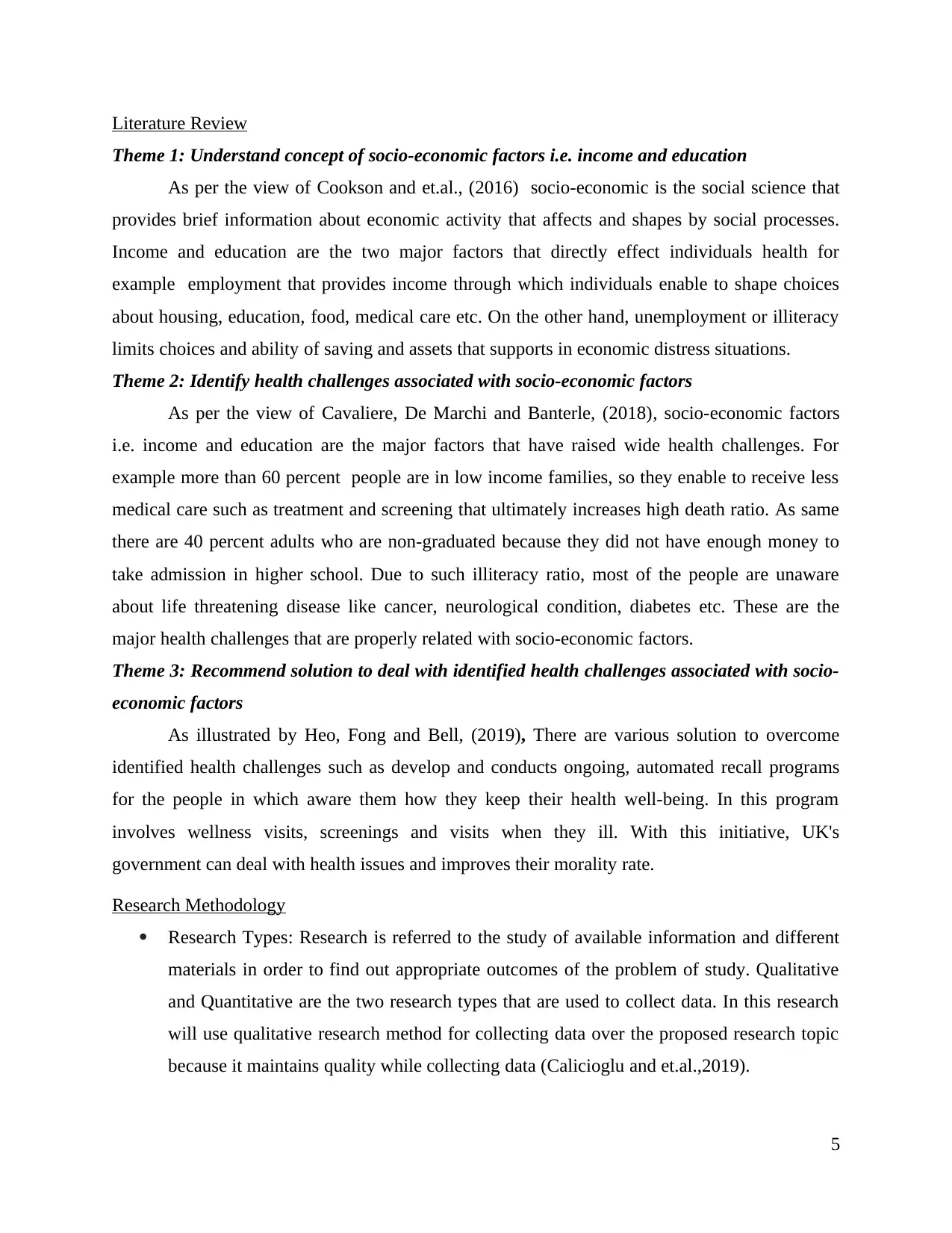
Literature Review
Theme 1: Understand concept of socio-economic factors i.e. income and education
As per the view of Cookson and et.al., (2016) socio-economic is the social science that
provides brief information about economic activity that affects and shapes by social processes.
Income and education are the two major factors that directly effect individuals health for
example employment that provides income through which individuals enable to shape choices
about housing, education, food, medical care etc. On the other hand, unemployment or illiteracy
limits choices and ability of saving and assets that supports in economic distress situations.
Theme 2: Identify health challenges associated with socio-economic factors
As per the view of Cavaliere, De Marchi and Banterle, (2018), socio-economic factors
i.e. income and education are the major factors that have raised wide health challenges. For
example more than 60 percent people are in low income families, so they enable to receive less
medical care such as treatment and screening that ultimately increases high death ratio. As same
there are 40 percent adults who are non-graduated because they did not have enough money to
take admission in higher school. Due to such illiteracy ratio, most of the people are unaware
about life threatening disease like cancer, neurological condition, diabetes etc. These are the
major health challenges that are properly related with socio-economic factors.
Theme 3: Recommend solution to deal with identified health challenges associated with socio-
economic factors
As illustrated by Heo, Fong and Bell, (2019), There are various solution to overcome
identified health challenges such as develop and conducts ongoing, automated recall programs
for the people in which aware them how they keep their health well-being. In this program
involves wellness visits, screenings and visits when they ill. With this initiative, UK's
government can deal with health issues and improves their morality rate.
Research Methodology
Research Types: Research is referred to the study of available information and different
materials in order to find out appropriate outcomes of the problem of study. Qualitative
and Quantitative are the two research types that are used to collect data. In this research
will use qualitative research method for collecting data over the proposed research topic
because it maintains quality while collecting data (Calicioglu and et.al.,2019).
5
Theme 1: Understand concept of socio-economic factors i.e. income and education
As per the view of Cookson and et.al., (2016) socio-economic is the social science that
provides brief information about economic activity that affects and shapes by social processes.
Income and education are the two major factors that directly effect individuals health for
example employment that provides income through which individuals enable to shape choices
about housing, education, food, medical care etc. On the other hand, unemployment or illiteracy
limits choices and ability of saving and assets that supports in economic distress situations.
Theme 2: Identify health challenges associated with socio-economic factors
As per the view of Cavaliere, De Marchi and Banterle, (2018), socio-economic factors
i.e. income and education are the major factors that have raised wide health challenges. For
example more than 60 percent people are in low income families, so they enable to receive less
medical care such as treatment and screening that ultimately increases high death ratio. As same
there are 40 percent adults who are non-graduated because they did not have enough money to
take admission in higher school. Due to such illiteracy ratio, most of the people are unaware
about life threatening disease like cancer, neurological condition, diabetes etc. These are the
major health challenges that are properly related with socio-economic factors.
Theme 3: Recommend solution to deal with identified health challenges associated with socio-
economic factors
As illustrated by Heo, Fong and Bell, (2019), There are various solution to overcome
identified health challenges such as develop and conducts ongoing, automated recall programs
for the people in which aware them how they keep their health well-being. In this program
involves wellness visits, screenings and visits when they ill. With this initiative, UK's
government can deal with health issues and improves their morality rate.
Research Methodology
Research Types: Research is referred to the study of available information and different
materials in order to find out appropriate outcomes of the problem of study. Qualitative
and Quantitative are the two research types that are used to collect data. In this research
will use qualitative research method for collecting data over the proposed research topic
because it maintains quality while collecting data (Calicioglu and et.al.,2019).
5
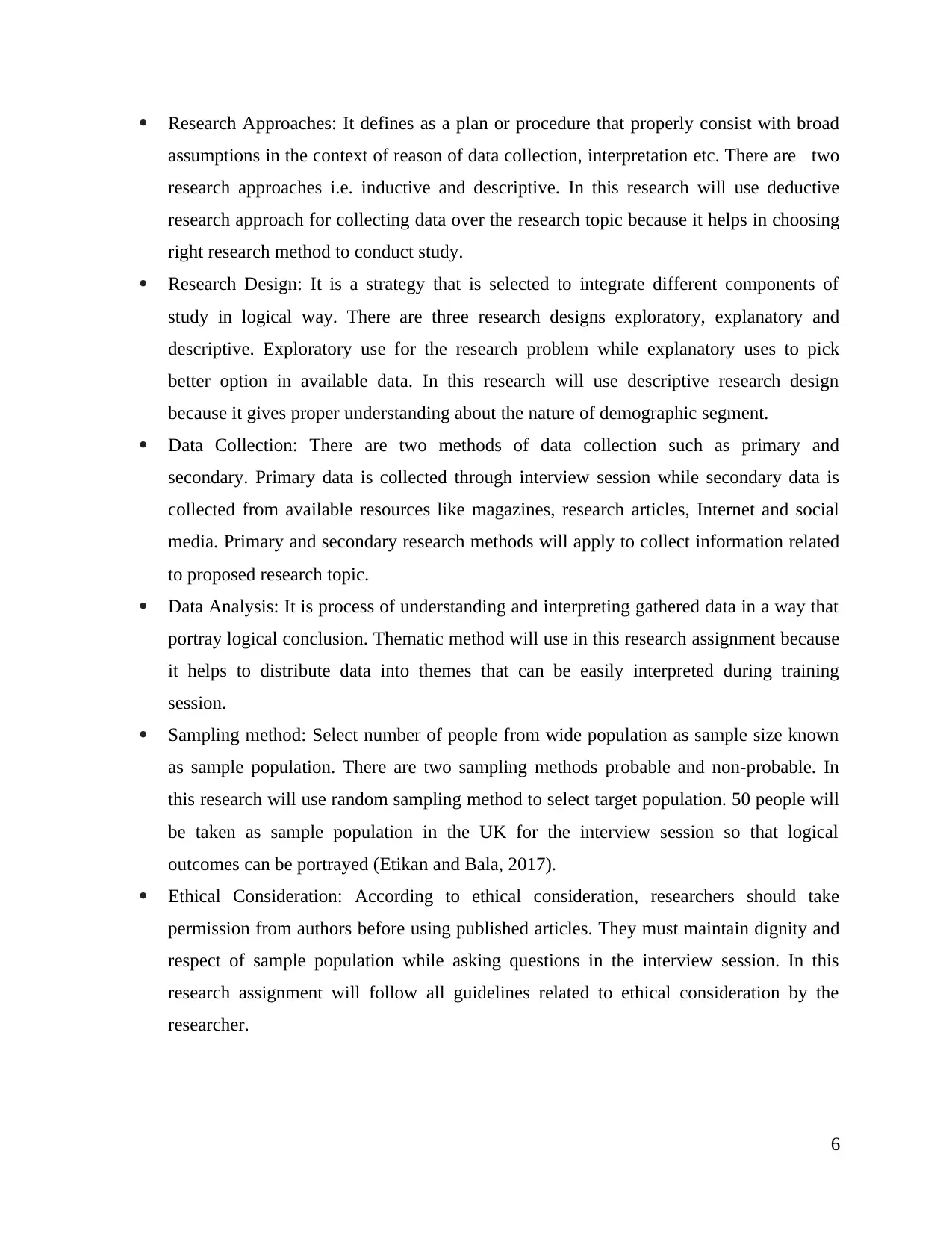
Research Approaches: It defines as a plan or procedure that properly consist with broad
assumptions in the context of reason of data collection, interpretation etc. There are two
research approaches i.e. inductive and descriptive. In this research will use deductive
research approach for collecting data over the research topic because it helps in choosing
right research method to conduct study.
Research Design: It is a strategy that is selected to integrate different components of
study in logical way. There are three research designs exploratory, explanatory and
descriptive. Exploratory use for the research problem while explanatory uses to pick
better option in available data. In this research will use descriptive research design
because it gives proper understanding about the nature of demographic segment.
Data Collection: There are two methods of data collection such as primary and
secondary. Primary data is collected through interview session while secondary data is
collected from available resources like magazines, research articles, Internet and social
media. Primary and secondary research methods will apply to collect information related
to proposed research topic.
Data Analysis: It is process of understanding and interpreting gathered data in a way that
portray logical conclusion. Thematic method will use in this research assignment because
it helps to distribute data into themes that can be easily interpreted during training
session.
Sampling method: Select number of people from wide population as sample size known
as sample population. There are two sampling methods probable and non-probable. In
this research will use random sampling method to select target population. 50 people will
be taken as sample population in the UK for the interview session so that logical
outcomes can be portrayed (Etikan and Bala, 2017).
Ethical Consideration: According to ethical consideration, researchers should take
permission from authors before using published articles. They must maintain dignity and
respect of sample population while asking questions in the interview session. In this
research assignment will follow all guidelines related to ethical consideration by the
researcher.
6
assumptions in the context of reason of data collection, interpretation etc. There are two
research approaches i.e. inductive and descriptive. In this research will use deductive
research approach for collecting data over the research topic because it helps in choosing
right research method to conduct study.
Research Design: It is a strategy that is selected to integrate different components of
study in logical way. There are three research designs exploratory, explanatory and
descriptive. Exploratory use for the research problem while explanatory uses to pick
better option in available data. In this research will use descriptive research design
because it gives proper understanding about the nature of demographic segment.
Data Collection: There are two methods of data collection such as primary and
secondary. Primary data is collected through interview session while secondary data is
collected from available resources like magazines, research articles, Internet and social
media. Primary and secondary research methods will apply to collect information related
to proposed research topic.
Data Analysis: It is process of understanding and interpreting gathered data in a way that
portray logical conclusion. Thematic method will use in this research assignment because
it helps to distribute data into themes that can be easily interpreted during training
session.
Sampling method: Select number of people from wide population as sample size known
as sample population. There are two sampling methods probable and non-probable. In
this research will use random sampling method to select target population. 50 people will
be taken as sample population in the UK for the interview session so that logical
outcomes can be portrayed (Etikan and Bala, 2017).
Ethical Consideration: According to ethical consideration, researchers should take
permission from authors before using published articles. They must maintain dignity and
respect of sample population while asking questions in the interview session. In this
research assignment will follow all guidelines related to ethical consideration by the
researcher.
6
⊘ This is a preview!⊘
Do you want full access?
Subscribe today to unlock all pages.

Trusted by 1+ million students worldwide
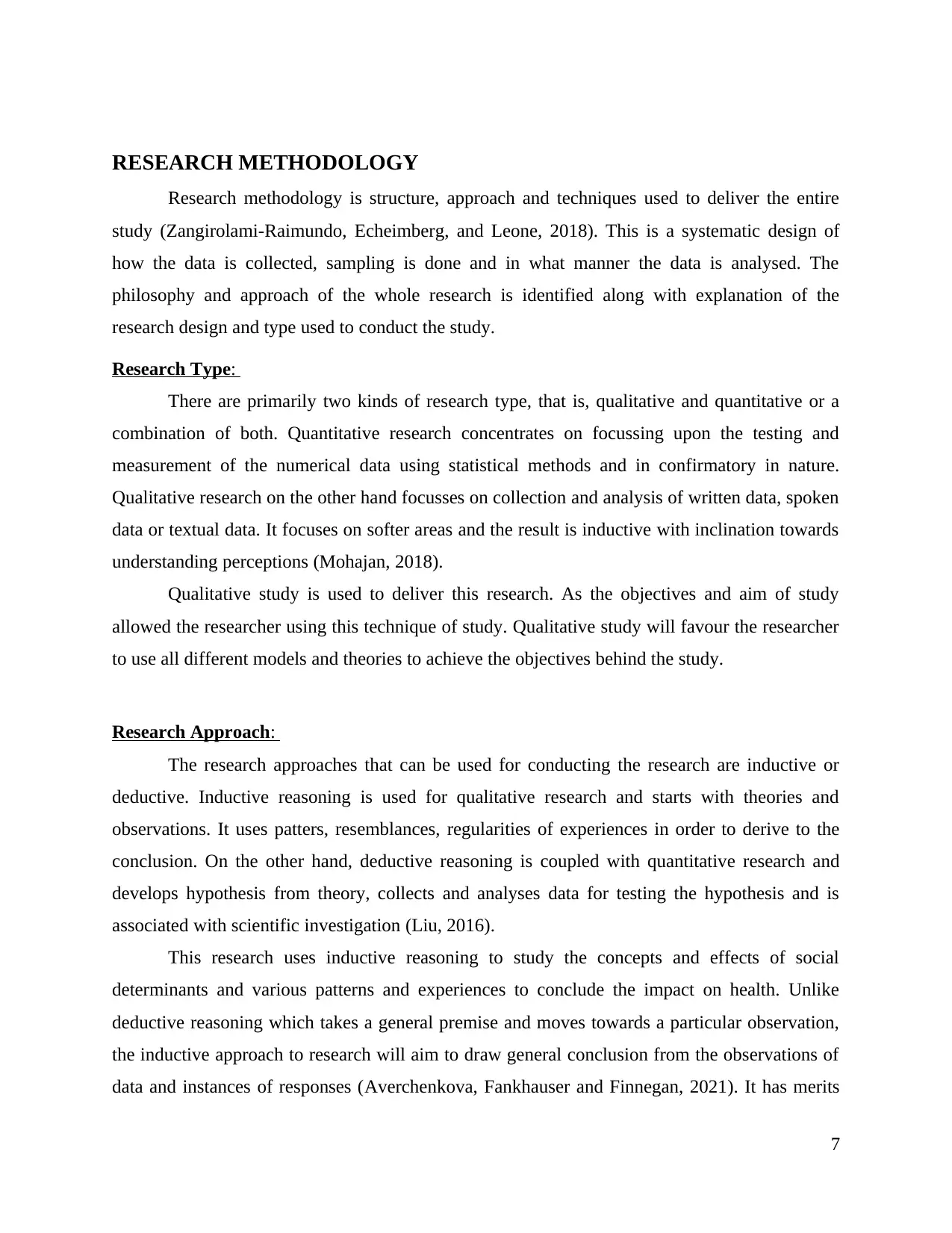
RESEARCH METHODOLOGY
Research methodology is structure, approach and techniques used to deliver the entire
study (Zangirolami-Raimundo, Echeimberg, and Leone, 2018). This is a systematic design of
how the data is collected, sampling is done and in what manner the data is analysed. The
philosophy and approach of the whole research is identified along with explanation of the
research design and type used to conduct the study.
Research Type:
There are primarily two kinds of research type, that is, qualitative and quantitative or a
combination of both. Quantitative research concentrates on focussing upon the testing and
measurement of the numerical data using statistical methods and in confirmatory in nature.
Qualitative research on the other hand focusses on collection and analysis of written data, spoken
data or textual data. It focuses on softer areas and the result is inductive with inclination towards
understanding perceptions (Mohajan, 2018).
Qualitative study is used to deliver this research. As the objectives and aim of study
allowed the researcher using this technique of study. Qualitative study will favour the researcher
to use all different models and theories to achieve the objectives behind the study.
Research Approach:
The research approaches that can be used for conducting the research are inductive or
deductive. Inductive reasoning is used for qualitative research and starts with theories and
observations. It uses patters, resemblances, regularities of experiences in order to derive to the
conclusion. On the other hand, deductive reasoning is coupled with quantitative research and
develops hypothesis from theory, collects and analyses data for testing the hypothesis and is
associated with scientific investigation (Liu, 2016).
This research uses inductive reasoning to study the concepts and effects of social
determinants and various patterns and experiences to conclude the impact on health. Unlike
deductive reasoning which takes a general premise and moves towards a particular observation,
the inductive approach to research will aim to draw general conclusion from the observations of
data and instances of responses (Averchenkova, Fankhauser and Finnegan, 2021). It has merits
7
Research methodology is structure, approach and techniques used to deliver the entire
study (Zangirolami-Raimundo, Echeimberg, and Leone, 2018). This is a systematic design of
how the data is collected, sampling is done and in what manner the data is analysed. The
philosophy and approach of the whole research is identified along with explanation of the
research design and type used to conduct the study.
Research Type:
There are primarily two kinds of research type, that is, qualitative and quantitative or a
combination of both. Quantitative research concentrates on focussing upon the testing and
measurement of the numerical data using statistical methods and in confirmatory in nature.
Qualitative research on the other hand focusses on collection and analysis of written data, spoken
data or textual data. It focuses on softer areas and the result is inductive with inclination towards
understanding perceptions (Mohajan, 2018).
Qualitative study is used to deliver this research. As the objectives and aim of study
allowed the researcher using this technique of study. Qualitative study will favour the researcher
to use all different models and theories to achieve the objectives behind the study.
Research Approach:
The research approaches that can be used for conducting the research are inductive or
deductive. Inductive reasoning is used for qualitative research and starts with theories and
observations. It uses patters, resemblances, regularities of experiences in order to derive to the
conclusion. On the other hand, deductive reasoning is coupled with quantitative research and
develops hypothesis from theory, collects and analyses data for testing the hypothesis and is
associated with scientific investigation (Liu, 2016).
This research uses inductive reasoning to study the concepts and effects of social
determinants and various patterns and experiences to conclude the impact on health. Unlike
deductive reasoning which takes a general premise and moves towards a particular observation,
the inductive approach to research will aim to draw general conclusion from the observations of
data and instances of responses (Averchenkova, Fankhauser and Finnegan, 2021). It has merits
7
Paraphrase This Document
Need a fresh take? Get an instant paraphrase of this document with our AI Paraphraser
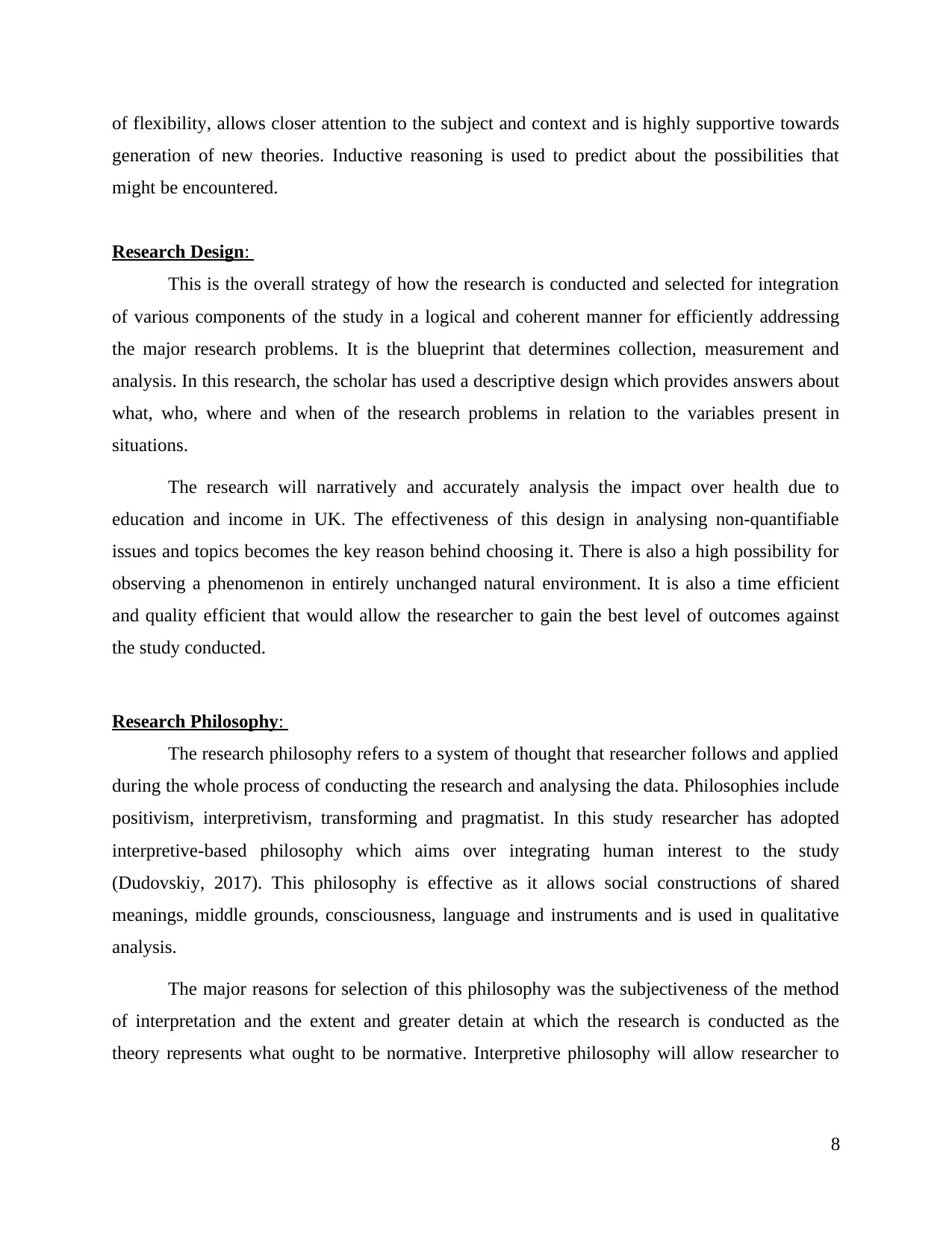
of flexibility, allows closer attention to the subject and context and is highly supportive towards
generation of new theories. Inductive reasoning is used to predict about the possibilities that
might be encountered.
Research Design:
This is the overall strategy of how the research is conducted and selected for integration
of various components of the study in a logical and coherent manner for efficiently addressing
the major research problems. It is the blueprint that determines collection, measurement and
analysis. In this research, the scholar has used a descriptive design which provides answers about
what, who, where and when of the research problems in relation to the variables present in
situations.
The research will narratively and accurately analysis the impact over health due to
education and income in UK. The effectiveness of this design in analysing non-quantifiable
issues and topics becomes the key reason behind choosing it. There is also a high possibility for
observing a phenomenon in entirely unchanged natural environment. It is also a time efficient
and quality efficient that would allow the researcher to gain the best level of outcomes against
the study conducted.
Research Philosophy:
The research philosophy refers to a system of thought that researcher follows and applied
during the whole process of conducting the research and analysing the data. Philosophies include
positivism, interpretivism, transforming and pragmatist. In this study researcher has adopted
interpretive-based philosophy which aims over integrating human interest to the study
(Dudovskiy, 2017). This philosophy is effective as it allows social constructions of shared
meanings, middle grounds, consciousness, language and instruments and is used in qualitative
analysis.
The major reasons for selection of this philosophy was the subjectiveness of the method
of interpretation and the extent and greater detain at which the research is conducted as the
theory represents what ought to be normative. Interpretive philosophy will allow researcher to
8
generation of new theories. Inductive reasoning is used to predict about the possibilities that
might be encountered.
Research Design:
This is the overall strategy of how the research is conducted and selected for integration
of various components of the study in a logical and coherent manner for efficiently addressing
the major research problems. It is the blueprint that determines collection, measurement and
analysis. In this research, the scholar has used a descriptive design which provides answers about
what, who, where and when of the research problems in relation to the variables present in
situations.
The research will narratively and accurately analysis the impact over health due to
education and income in UK. The effectiveness of this design in analysing non-quantifiable
issues and topics becomes the key reason behind choosing it. There is also a high possibility for
observing a phenomenon in entirely unchanged natural environment. It is also a time efficient
and quality efficient that would allow the researcher to gain the best level of outcomes against
the study conducted.
Research Philosophy:
The research philosophy refers to a system of thought that researcher follows and applied
during the whole process of conducting the research and analysing the data. Philosophies include
positivism, interpretivism, transforming and pragmatist. In this study researcher has adopted
interpretive-based philosophy which aims over integrating human interest to the study
(Dudovskiy, 2017). This philosophy is effective as it allows social constructions of shared
meanings, middle grounds, consciousness, language and instruments and is used in qualitative
analysis.
The major reasons for selection of this philosophy was the subjectiveness of the method
of interpretation and the extent and greater detain at which the research is conducted as the
theory represents what ought to be normative. Interpretive philosophy will allow researcher to
8
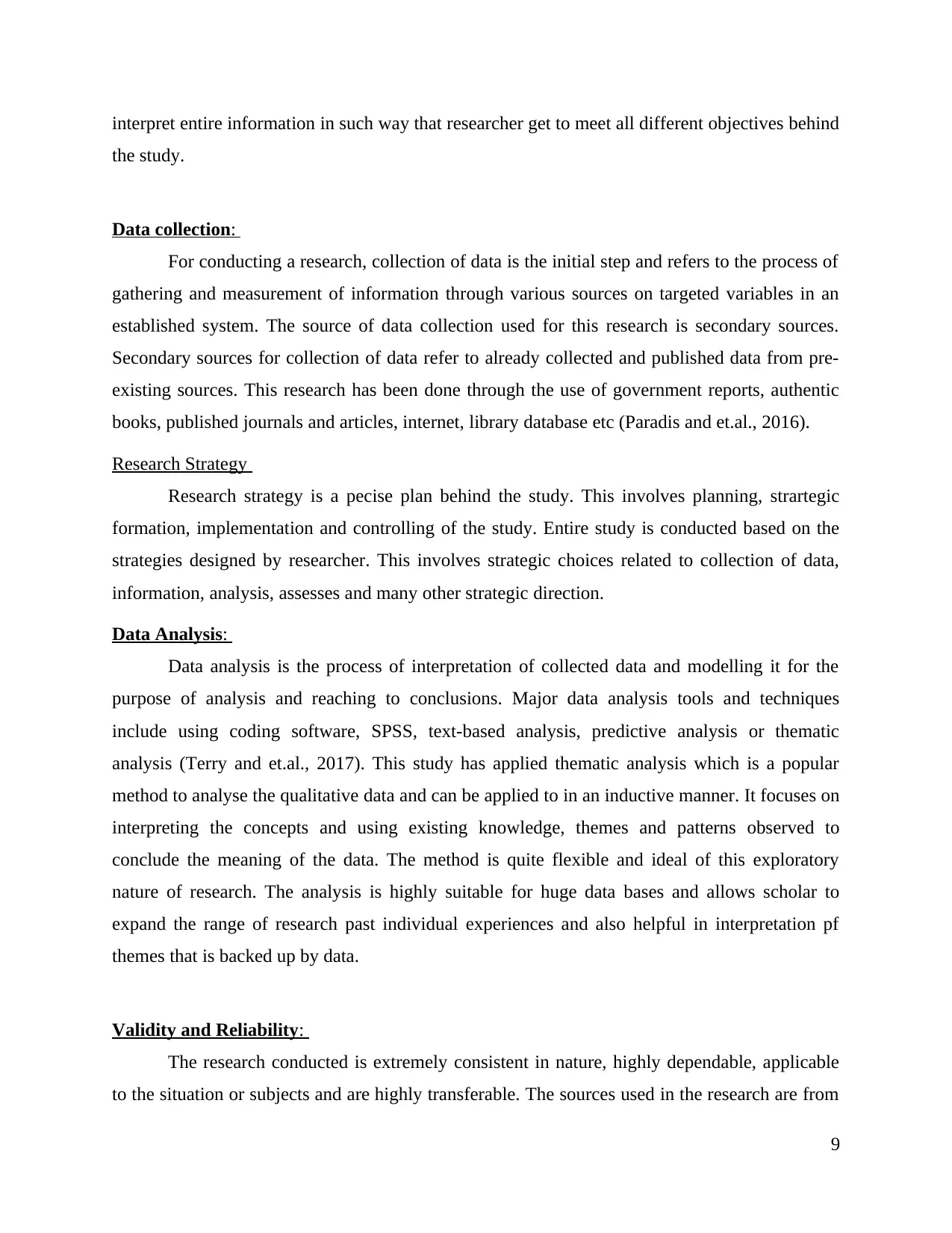
interpret entire information in such way that researcher get to meet all different objectives behind
the study.
Data collection:
For conducting a research, collection of data is the initial step and refers to the process of
gathering and measurement of information through various sources on targeted variables in an
established system. The source of data collection used for this research is secondary sources.
Secondary sources for collection of data refer to already collected and published data from pre-
existing sources. This research has been done through the use of government reports, authentic
books, published journals and articles, internet, library database etc (Paradis and et.al., 2016).
Research Strategy
Research strategy is a pecise plan behind the study. This involves planning, strartegic
formation, implementation and controlling of the study. Entire study is conducted based on the
strategies designed by researcher. This involves strategic choices related to collection of data,
information, analysis, assesses and many other strategic direction.
Data Analysis:
Data analysis is the process of interpretation of collected data and modelling it for the
purpose of analysis and reaching to conclusions. Major data analysis tools and techniques
include using coding software, SPSS, text-based analysis, predictive analysis or thematic
analysis (Terry and et.al., 2017). This study has applied thematic analysis which is a popular
method to analyse the qualitative data and can be applied to in an inductive manner. It focuses on
interpreting the concepts and using existing knowledge, themes and patterns observed to
conclude the meaning of the data. The method is quite flexible and ideal of this exploratory
nature of research. The analysis is highly suitable for huge data bases and allows scholar to
expand the range of research past individual experiences and also helpful in interpretation pf
themes that is backed up by data.
Validity and Reliability:
The research conducted is extremely consistent in nature, highly dependable, applicable
to the situation or subjects and are highly transferable. The sources used in the research are from
9
the study.
Data collection:
For conducting a research, collection of data is the initial step and refers to the process of
gathering and measurement of information through various sources on targeted variables in an
established system. The source of data collection used for this research is secondary sources.
Secondary sources for collection of data refer to already collected and published data from pre-
existing sources. This research has been done through the use of government reports, authentic
books, published journals and articles, internet, library database etc (Paradis and et.al., 2016).
Research Strategy
Research strategy is a pecise plan behind the study. This involves planning, strartegic
formation, implementation and controlling of the study. Entire study is conducted based on the
strategies designed by researcher. This involves strategic choices related to collection of data,
information, analysis, assesses and many other strategic direction.
Data Analysis:
Data analysis is the process of interpretation of collected data and modelling it for the
purpose of analysis and reaching to conclusions. Major data analysis tools and techniques
include using coding software, SPSS, text-based analysis, predictive analysis or thematic
analysis (Terry and et.al., 2017). This study has applied thematic analysis which is a popular
method to analyse the qualitative data and can be applied to in an inductive manner. It focuses on
interpreting the concepts and using existing knowledge, themes and patterns observed to
conclude the meaning of the data. The method is quite flexible and ideal of this exploratory
nature of research. The analysis is highly suitable for huge data bases and allows scholar to
expand the range of research past individual experiences and also helpful in interpretation pf
themes that is backed up by data.
Validity and Reliability:
The research conducted is extremely consistent in nature, highly dependable, applicable
to the situation or subjects and are highly transferable. The sources used in the research are from
9
⊘ This is a preview!⊘
Do you want full access?
Subscribe today to unlock all pages.

Trusted by 1+ million students worldwide
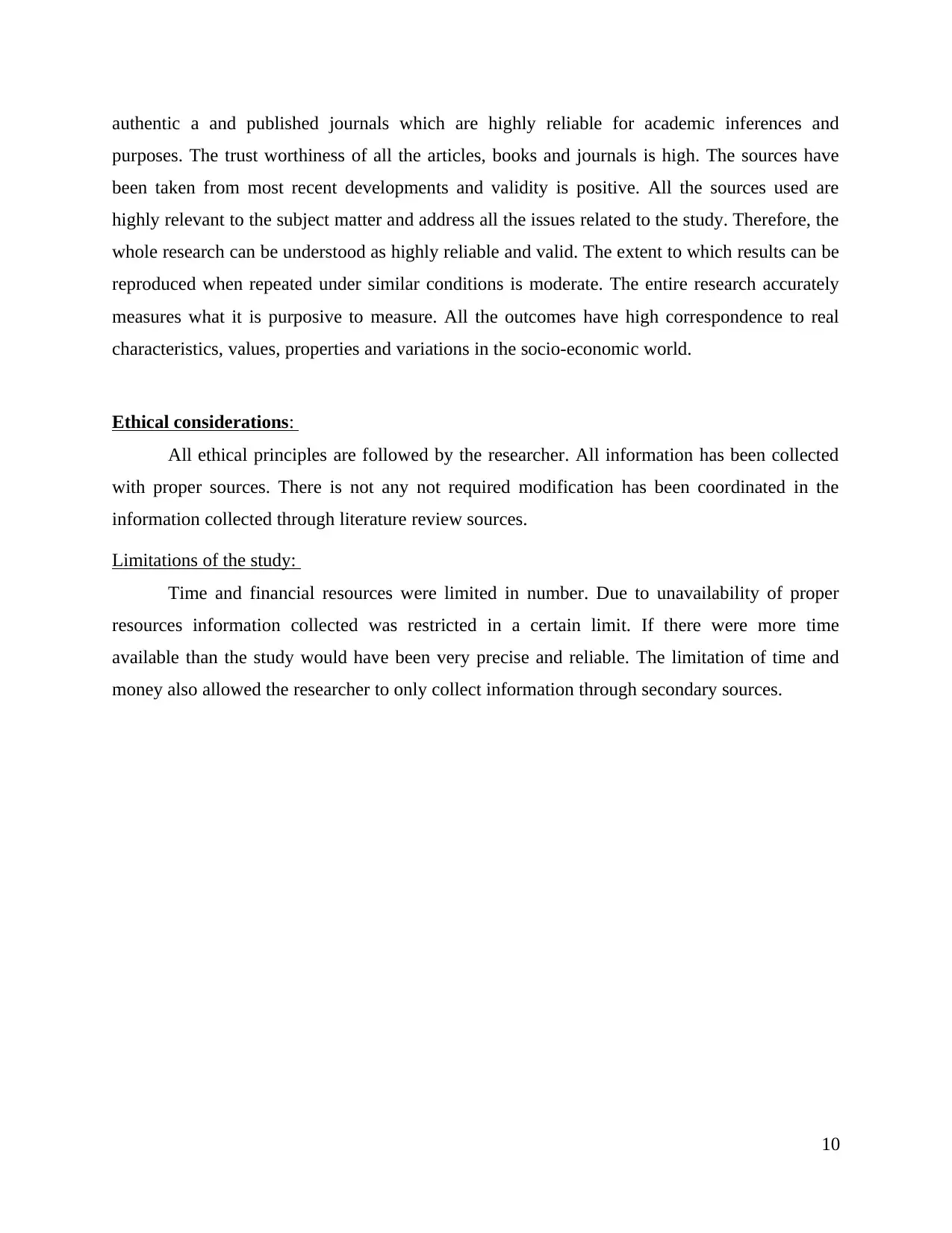
authentic a and published journals which are highly reliable for academic inferences and
purposes. The trust worthiness of all the articles, books and journals is high. The sources have
been taken from most recent developments and validity is positive. All the sources used are
highly relevant to the subject matter and address all the issues related to the study. Therefore, the
whole research can be understood as highly reliable and valid. The extent to which results can be
reproduced when repeated under similar conditions is moderate. The entire research accurately
measures what it is purposive to measure. All the outcomes have high correspondence to real
characteristics, values, properties and variations in the socio-economic world.
Ethical considerations:
All ethical principles are followed by the researcher. All information has been collected
with proper sources. There is not any not required modification has been coordinated in the
information collected through literature review sources.
Limitations of the study:
Time and financial resources were limited in number. Due to unavailability of proper
resources information collected was restricted in a certain limit. If there were more time
available than the study would have been very precise and reliable. The limitation of time and
money also allowed the researcher to only collect information through secondary sources.
10
purposes. The trust worthiness of all the articles, books and journals is high. The sources have
been taken from most recent developments and validity is positive. All the sources used are
highly relevant to the subject matter and address all the issues related to the study. Therefore, the
whole research can be understood as highly reliable and valid. The extent to which results can be
reproduced when repeated under similar conditions is moderate. The entire research accurately
measures what it is purposive to measure. All the outcomes have high correspondence to real
characteristics, values, properties and variations in the socio-economic world.
Ethical considerations:
All ethical principles are followed by the researcher. All information has been collected
with proper sources. There is not any not required modification has been coordinated in the
information collected through literature review sources.
Limitations of the study:
Time and financial resources were limited in number. Due to unavailability of proper
resources information collected was restricted in a certain limit. If there were more time
available than the study would have been very precise and reliable. The limitation of time and
money also allowed the researcher to only collect information through secondary sources.
10
Paraphrase This Document
Need a fresh take? Get an instant paraphrase of this document with our AI Paraphraser
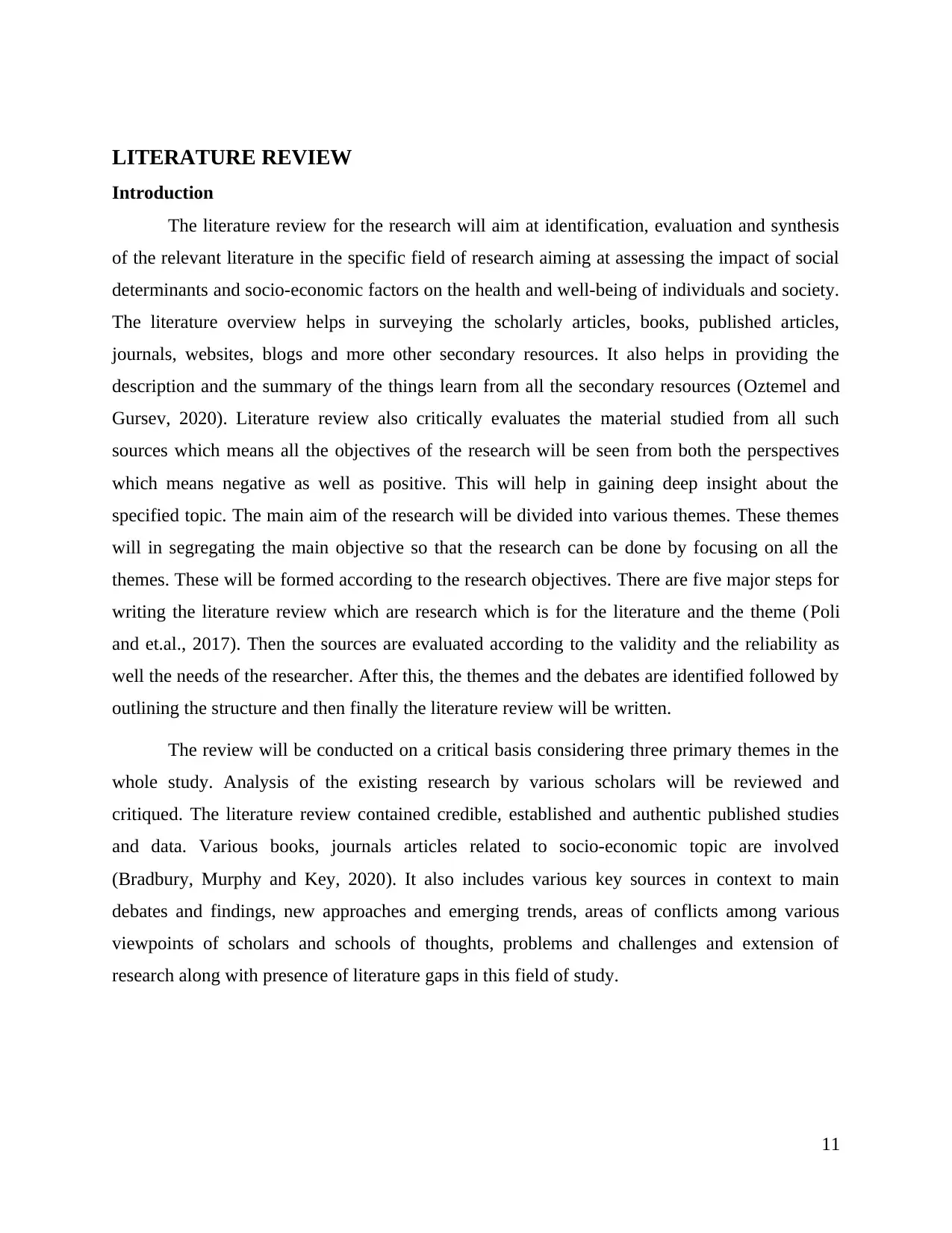
LITERATURE REVIEW
Introduction
The literature review for the research will aim at identification, evaluation and synthesis
of the relevant literature in the specific field of research aiming at assessing the impact of social
determinants and socio-economic factors on the health and well-being of individuals and society.
The literature overview helps in surveying the scholarly articles, books, published articles,
journals, websites, blogs and more other secondary resources. It also helps in providing the
description and the summary of the things learn from all the secondary resources (Oztemel and
Gursev, 2020). Literature review also critically evaluates the material studied from all such
sources which means all the objectives of the research will be seen from both the perspectives
which means negative as well as positive. This will help in gaining deep insight about the
specified topic. The main aim of the research will be divided into various themes. These themes
will in segregating the main objective so that the research can be done by focusing on all the
themes. These will be formed according to the research objectives. There are five major steps for
writing the literature review which are research which is for the literature and the theme (Poli
and et.al., 2017). Then the sources are evaluated according to the validity and the reliability as
well the needs of the researcher. After this, the themes and the debates are identified followed by
outlining the structure and then finally the literature review will be written.
The review will be conducted on a critical basis considering three primary themes in the
whole study. Analysis of the existing research by various scholars will be reviewed and
critiqued. The literature review contained credible, established and authentic published studies
and data. Various books, journals articles related to socio-economic topic are involved
(Bradbury, Murphy and Key, 2020). It also includes various key sources in context to main
debates and findings, new approaches and emerging trends, areas of conflicts among various
viewpoints of scholars and schools of thoughts, problems and challenges and extension of
research along with presence of literature gaps in this field of study.
11
Introduction
The literature review for the research will aim at identification, evaluation and synthesis
of the relevant literature in the specific field of research aiming at assessing the impact of social
determinants and socio-economic factors on the health and well-being of individuals and society.
The literature overview helps in surveying the scholarly articles, books, published articles,
journals, websites, blogs and more other secondary resources. It also helps in providing the
description and the summary of the things learn from all the secondary resources (Oztemel and
Gursev, 2020). Literature review also critically evaluates the material studied from all such
sources which means all the objectives of the research will be seen from both the perspectives
which means negative as well as positive. This will help in gaining deep insight about the
specified topic. The main aim of the research will be divided into various themes. These themes
will in segregating the main objective so that the research can be done by focusing on all the
themes. These will be formed according to the research objectives. There are five major steps for
writing the literature review which are research which is for the literature and the theme (Poli
and et.al., 2017). Then the sources are evaluated according to the validity and the reliability as
well the needs of the researcher. After this, the themes and the debates are identified followed by
outlining the structure and then finally the literature review will be written.
The review will be conducted on a critical basis considering three primary themes in the
whole study. Analysis of the existing research by various scholars will be reviewed and
critiqued. The literature review contained credible, established and authentic published studies
and data. Various books, journals articles related to socio-economic topic are involved
(Bradbury, Murphy and Key, 2020). It also includes various key sources in context to main
debates and findings, new approaches and emerging trends, areas of conflicts among various
viewpoints of scholars and schools of thoughts, problems and challenges and extension of
research along with presence of literature gaps in this field of study.
11
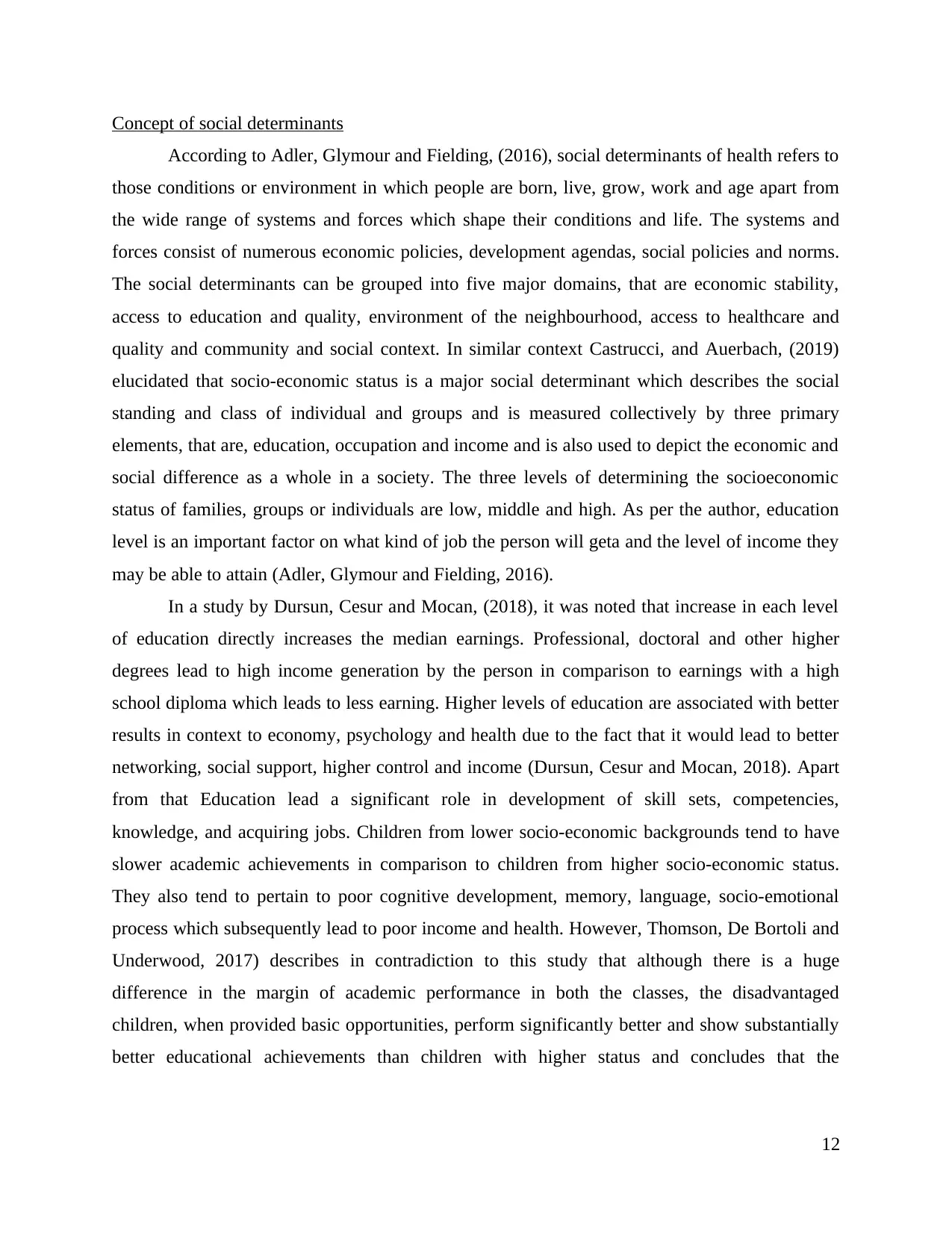
Concept of social determinants
According to Adler, Glymour and Fielding, (2016), social determinants of health refers to
those conditions or environment in which people are born, live, grow, work and age apart from
the wide range of systems and forces which shape their conditions and life. The systems and
forces consist of numerous economic policies, development agendas, social policies and norms.
The social determinants can be grouped into five major domains, that are economic stability,
access to education and quality, environment of the neighbourhood, access to healthcare and
quality and community and social context. In similar context Castrucci, and Auerbach, (2019)
elucidated that socio-economic status is a major social determinant which describes the social
standing and class of individual and groups and is measured collectively by three primary
elements, that are, education, occupation and income and is also used to depict the economic and
social difference as a whole in a society. The three levels of determining the socioeconomic
status of families, groups or individuals are low, middle and high. As per the author, education
level is an important factor on what kind of job the person will geta and the level of income they
may be able to attain (Adler, Glymour and Fielding, 2016).
In a study by Dursun, Cesur and Mocan, (2018), it was noted that increase in each level
of education directly increases the median earnings. Professional, doctoral and other higher
degrees lead to high income generation by the person in comparison to earnings with a high
school diploma which leads to less earning. Higher levels of education are associated with better
results in context to economy, psychology and health due to the fact that it would lead to better
networking, social support, higher control and income (Dursun, Cesur and Mocan, 2018). Apart
from that Education lead a significant role in development of skill sets, competencies,
knowledge, and acquiring jobs. Children from lower socio-economic backgrounds tend to have
slower academic achievements in comparison to children from higher socio-economic status.
They also tend to pertain to poor cognitive development, memory, language, socio-emotional
process which subsequently lead to poor income and health. However, Thomson, De Bortoli and
Underwood, 2017) describes in contradiction to this study that although there is a huge
difference in the margin of academic performance in both the classes, the disadvantaged
children, when provided basic opportunities, perform significantly better and show substantially
better educational achievements than children with higher status and concludes that the
12
According to Adler, Glymour and Fielding, (2016), social determinants of health refers to
those conditions or environment in which people are born, live, grow, work and age apart from
the wide range of systems and forces which shape their conditions and life. The systems and
forces consist of numerous economic policies, development agendas, social policies and norms.
The social determinants can be grouped into five major domains, that are economic stability,
access to education and quality, environment of the neighbourhood, access to healthcare and
quality and community and social context. In similar context Castrucci, and Auerbach, (2019)
elucidated that socio-economic status is a major social determinant which describes the social
standing and class of individual and groups and is measured collectively by three primary
elements, that are, education, occupation and income and is also used to depict the economic and
social difference as a whole in a society. The three levels of determining the socioeconomic
status of families, groups or individuals are low, middle and high. As per the author, education
level is an important factor on what kind of job the person will geta and the level of income they
may be able to attain (Adler, Glymour and Fielding, 2016).
In a study by Dursun, Cesur and Mocan, (2018), it was noted that increase in each level
of education directly increases the median earnings. Professional, doctoral and other higher
degrees lead to high income generation by the person in comparison to earnings with a high
school diploma which leads to less earning. Higher levels of education are associated with better
results in context to economy, psychology and health due to the fact that it would lead to better
networking, social support, higher control and income (Dursun, Cesur and Mocan, 2018). Apart
from that Education lead a significant role in development of skill sets, competencies,
knowledge, and acquiring jobs. Children from lower socio-economic backgrounds tend to have
slower academic achievements in comparison to children from higher socio-economic status.
They also tend to pertain to poor cognitive development, memory, language, socio-emotional
process which subsequently lead to poor income and health. However, Thomson, De Bortoli and
Underwood, 2017) describes in contradiction to this study that although there is a huge
difference in the margin of academic performance in both the classes, the disadvantaged
children, when provided basic opportunities, perform significantly better and show substantially
better educational achievements than children with higher status and concludes that the
12
⊘ This is a preview!⊘
Do you want full access?
Subscribe today to unlock all pages.

Trusted by 1+ million students worldwide
1 out of 36
Related Documents
Your All-in-One AI-Powered Toolkit for Academic Success.
+13062052269
info@desklib.com
Available 24*7 on WhatsApp / Email
![[object Object]](/_next/static/media/star-bottom.7253800d.svg)
Unlock your academic potential
Copyright © 2020–2025 A2Z Services. All Rights Reserved. Developed and managed by ZUCOL.





